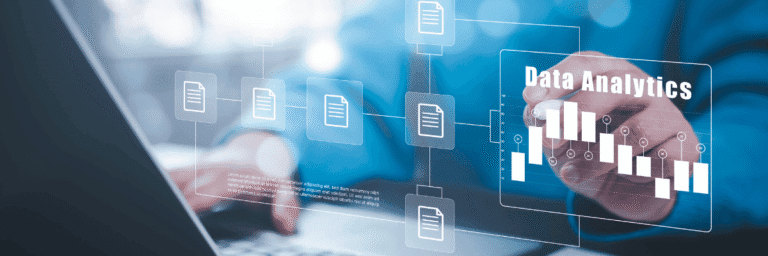Many companies still struggle with slow forecasts, manual data entry, and scattered reports. These issues cost time and lead to poor decisions. That is why interest in AI in ERP is growing fast. According to IDC, by 2027 about 75 percent of companies will move from monolithic ERP to modular systems built to work with AI. This shift is not about chasing trends. It is about making ERP smarter so businesses can predict demand, spot risks early, and reduce waste.
SAP has already integrated AI into its ERP with tools like Joule, a digital assistant that helps managers pull insights without digging through spreadsheets. Other vendors are following the same path. The question for most companies is not if AI in ERP matters but how soon they can start using it. And that is what we will cover here.
Redefine Enterprise Efficiency With AI-Powered Solutions!
Partner with Kanerika for Expert AI implementation Services
What Are AI-Enhanced ERP Systems?
Artificial intelligence in ERP refers to integrating AI technologies like machine learning, natural language processing, and predictive analytics into ERP systems. Think of it as your regular enterprise resource planning system but with a smart brain that learns from your data.
Machine learning ERP systems don’t just store information. They study patterns in your sales, inventory, and customer behavior. Then they make predictions. Machine learning algorithms can quickly evaluate enormous volumes of data when connected with an ERP system.
Intelligent ERP systems work differently than traditional ones. Regular ERP shows you what happened last month. AI-powered versions tell you what’s likely to happen next month. AI-powered ERP systems enhance business operations by providing real-time insights, automating repetitive tasks, improving data accuracy, and enabling predictive analytics.
The core difference is simple. Traditional ERP requires you to ask questions and wait for reports. AI ERP software proactively surfaces insights. It might alert you when inventory is running low or flag unusual spending patterns before they become problems.
AI-enabled ERP systems automate repetitive tasks such as reporting, payables processing, supplier onboarding, and expense management. This frees up your team to focus on strategy instead of data entry.
How Does AI Integration Work in ERP Systems?
1. Technical Architecture of AI-ERP Integration
AI integration happens through layered architecture that sits on top of your existing ERP foundation. IFS AI is built on a powerful, flexible cloud platform that supports multiple deployment options, integration capabilities, and open APIs. The system connects through API layers that handle authentication, data processing, and security.
- API Management Layer – Controls data flow between AI services and ERP modules
- Microservices Architecture – Breaks down complex ERP modules like Finance, HR, and Procurement into independent services.
- Data Processing Engine – Handles machine learning algorithms and predictive analytics
- Security Framework – Manages access control and data protection protocols
2. Data Flow and Processing Mechanisms
Your ERP data moves through multiple processing stages before AI can work with it. Raw information gets cleaned, structured, and fed into machine learning models that generate insights. AI-ERP methodology uses various AI and ML techniques to automate tasks and make decisions.
- Data Extraction – Pulls information from ERP databases and external sources
- Data Transformation – Converts raw data into formats AI algorithms can process
- Pattern Recognition – Identifies trends and anomalies in business operations
- Insight Generation – Creates actionable recommendations for business users
3. Real-time vs. Batch Processing Capabilities
Modern ERP systems excel in real-time monitoring and quality management. Real-time processing handles urgent decisions like inventory alerts. Batch processing works on complex analytics that don’t need immediate results.
- Real-time Processing – Instant alerts, fraud detection, inventory warnings
- Batch Processing – Monthly forecasts, trend analysis, performance reports
- Hybrid Approach – Handles batch, real-time, and event-based processing to ensure agents get the right context at the right time
- Event-driven Updates – Triggers AI analysis when specific business events occur
4. Cloud vs. On-Premises AI ERP Deployment Models
On-premises ERP systems are installed locally on company hardware and offer greater control but require significant upfront investment. Cloud deployment provides faster setup and automatic updates. Both models support AI ERP integration but with different trade-offs.
- Cloud AI ERP – Faster deployment, automatic AI model updates, lower upfront costs
- On-Premises AI ERP – Greater data control, customization options, higher security control
- Hybrid Models – Offers both cloud and on-premises options for flexible deployment
- Security Considerations – Each model handles data privacy and compliance differently
AI for Real Estate: How to Leverage AI for Smarter Investment Decisions
What if your next real estate deal was closed not by an agent—but by an algorithm?
Top AI ERP Use Cases: What Smart Businesses Are Doing Right Now
1. Demand Forecasting & Inventory Optimization
AI transforms how businesses predict customer demand and manage stock levels. According to McKinsey, AI-based forecasting reduces errors by 20-50% and cuts lost sales by up to 65%. Your system learns from seasonal patterns, market trends, and customer behavior to make accurate predictions.
- Smart Inventory Management – Automatic reorder points based on predicted demand
- Seasonal Demand Prediction – AI spots trends humans miss in historical data
- Stock Optimization – Reduces warehousing costs by 5-10% through better inventory planning
- Waste Reduction – Prevents overstock and stockout situations
2. Business Process Automation
Modern AI ERP systems handle routine tasks that used to eat up employee time. Businesses investing in enterprise AI boost productivity by 50%. Workers can focus on strategy while AI manages the repetitive stuff.
- Invoice Processing – AI handles payment matching and extraction automatically
- Data Entry Automation – Eliminates manual input errors and speeds up workflows
- HR Task Management – Chatbots handle employee self-service portals and HR questions
- Report Generation – Creates financial and operational reports without human intervention
3. Supply Chain Intelligence
AI analyzes your entire supply chain to find inefficiencies and optimize operations. Companies like ZF Friedrichshafen use AI for global demand planning across unified ERP systems. The technology spots problems before they disrupt your business.
- Route Optimization – AI minimizes transportation costs and improves delivery times
- Supplier Performance Tracking – Monitors vendor reliability and quality metrics
- Production Planning – Coordinates manufacturing schedules with demand forecasts
- Risk Monitoring – Identifies potential supply chain disruptions early
4. Predictive Analytics & Risk Detection
Your AI ERP system constantly monitors business patterns and flags anomalies. AI improves forecast accuracy and decision-making by analyzing vast amounts of data. You get early warnings about issues that could cost money later.
- Financial Fraud Detection – Spots unusual spending patterns and transactions
- Equipment Maintenance Alerts – Forecasts when machinery needs maintenance based on IoT sensor data
- Cash Flow Predictions – Warns about potential liquidity problems
- Customer Churn Prevention – Identifies customers likely to leave your business
5. Conversational AI Assistants
Chatbots and virtual assistants bridge the gap between human communication and machine understanding. Users can ask questions in plain English instead of learning complex system commands.
- Natural Language Queries – Ask “What were last month’s sales?” instead of running reports
- Task Automation – Digital assistants help retrieve information and perform tasks
- Employee Self-Service – Workers get instant answers without calling IT support
- System Navigation – AI guides users through complex ERP functions
6. Financial Management & Compliance
AI-powered cloud ERP systems provide real-time insights and automated processes for finance teams. Your financial operations become faster and more accurate with less manual oversight.
- Automated Reconciliation – Matches transactions and identifies discrepancies automatically
- Regulatory Reporting – Ensures compliance with changing financial regulations
- Budget Variance Analysis – Compares actual vs. planned spending in real-time
- Credit Risk Assessment – Evaluates customer creditworthiness using multiple data sources
7. Customer Experience Enhancement
AI in ERP systems creates personalized customer interactions by analyzing purchase history and behavior patterns. Companies using AI for customer experience see 10-15% increases in revenue and 20% improvements in customer satisfaction. Your team gets complete customer insights without switching between multiple systems.
- Personalized Product Recommendations – AI suggests relevant products based on customer history
- Dynamic Pricing Optimization – Adjusts prices based on demand, competition, and customer segments
- Customer Lifetime Value Prediction – Identifies high-value customers for targeted marketing
- Service Request Automation – Routes support tickets to appropriate departments automatically
8. Quality Control & Manufacturing Intelligence
AI-powered quality control systems can detect defects with 99% accuracy compared to 85% for human inspectors. Manufacturing operations become more efficient when AI monitors production quality in real-time.
- Defect Detection – Computer vision identifies product flaws during manufacturing
- Production Optimization – AI adjusts machine settings for optimal output quality
- Batch Quality Tracking – Monitors product quality across entire production runs
- Compliance Monitoring – Ensures manufacturing meets industry standards automatically
9. Human Resources Optimization
AI transforms how businesses manage their workforce by analyzing employee data and predicting HR needs. Companies using AI in HR report 40% faster hiring and 25% reduction in employee turnover. Your HR team can focus on strategic initiatives instead of administrative tasks.
- Talent Acquisition – AI screens resumes and identifies best-fit candidates
- Employee Performance Prediction – Identifies top performers and flight risks
- Workforce Planning – Predicts staffing needs based on business forecasts
- Training Recommendations – Suggests skill development programs for individual employees
10. Project Management Intelligence
AI enhances project planning and execution by analyzing resource allocation and timeline data. Project management AI tools improve on-time delivery rates. Teams can anticipate problems and adjust plans before delays occur.
- Resource Allocation Optimization – AI assigns team members based on skills and availability
- Timeline Prediction – Forecasts project completion dates using historical data
- Budget Tracking – Monitors project expenses and warns about cost overruns
- Risk Assessment – Identifies potential project roadblocks before they impact deadlines
Key AI Technologies in Modern ERP Systems Effective
1. Machine Learning (ML) in ERP
- ML studies historical ERP data and finds patterns in sales, supply, and costs.
- It gets better as more data flows into the ERP system.
- Used for AI ERP forecasting in demand planning, cash flow prediction, and workforce planning.
- Supports faster decision-making by reducing guesswork.
- Example: predicting stockouts or surplus weeks before they happen.
2. Natural Language Processing (NLP) and LLMs
- NLP lets users type or speak questions into ERP systems.
- Instead of searching reports, managers can ask: “Show me Q2 sales by region.”
- Large Language Models (LLMs) expand this by handling complex queries.
- This makes ERP software more user-friendly and cuts training needs.
- Tools like SAP Joule or Oracle AI Copilots already use NLP inside ERP.
3. Robotic Process Automation (RPA) in ERP
- RPA automates routine ERP tasks like invoice matching or purchase order approvals.
- Bots follow fixed rules and reduce human error in data entry.
- Helps finance, HR, and procurement teams save time.
- Cuts processing costs by automating repetitive workflows.
- Often the first step for companies starting with ERP automation using AI.
4. Agentic AI in ERP
- Goes beyond simple bots.
- Can handle broader instructions, such as “optimize supplier contracts under $50K.”
- It knows when to ask for human input before final action.
- Useful in complex ERP workflows where strict rules don’t work.
- Seen as the bridge to autonomous ERP systems in the future.
5. Emerging Architectures
Generative BP AI Agents (FinRobot)
- Focus on business process automation inside ERP.
- Example: AI agents for financial reporting cut error rates by up to 94 percent in tests.
- These agents not only automate but also suggest better workflows.
- Expected to transform ERP in finance, audits, and compliance.
Self-Adaptive ERP with NLP (Petri-Net Models)
- ERP that learns and adjusts workflows automatically.
- Uses NLP to update processes without deep customization.
- Reduces cost of ERP upgrades since less manual coding is needed.
- Makes systems more flexible as business needs change.
AI Inventory Management: Tools, Benefits, and Best Practices for 2025
AI Inventory Management leverages machine learning and predictive analytics to optimize stock levels, reduce costs, and enhance supply chain efficiency through intelligent inventory tracking and forecasting.
Top 10 Benefits of AI in Enterprise Resource Planning Systems
AI in ERP is not just about faster processes. It changes how companies plan, decide, and respond. Below are ten clear benefits that businesses see when they bring artificial intelligence into their ERP systems.
1. Better Demand Forecasting
AI ERP forecasting tools use machine learning to predict sales and inventory needs. This cuts waste and lowers carrying costs.
2. Faster Decision-Making
With AI-powered ERP analytics, managers get real-time insights. No waiting for reports or manual data pulls. Decisions are made with current numbers, not guesswork.
3. Lower Operational Costs
ERP automation with AI reduces time spent on manual tasks like invoice matching or payroll checks. Companies spend less on labor and rework.
4. Improved Data Accuracy
AI-driven ERP systems catch errors in entries or mismatched transactions. Clean data leads to better reporting and compliance.
5. Supply Chain Optimization
AI in enterprise resource planning improves order management and delivery schedules. It balances demand and supply more effectively.
6. Personalized User Experience
Modern AI ERP software includes chatbots and assistants. These guide employees through tasks and reduce training time.
7. Risk Detection and Compliance
AI tools in ERP track unusual patterns that may point to fraud or compliance risks. Early alerts reduce financial exposure.
8. Scalability for Growth
AI ERP systems adapt to new data, markets, or locations. Businesses can expand without worrying about old workflows breaking.
9. Better Customer Service
With AI ERP automation, support teams get quick access to full customer histories. Faster responses mean higher customer satisfaction.
10. Competitive Advantage
Companies using AI-powered ERP software operate leaner and react quicker to market shifts. This edge keeps them ahead of slower rivals.
Achieve 10x Business Growth with Custom AI Innovations!
Partner with Kanerika for Expert AI implementation Services
10 Best AI-Enabled ERP Systems in 2025
1. SAP S/4HANA with AI Capabilities
SAP S/4HANA integrates machine learning and predictive analytics directly into core business processes. The system automates routine tasks and provides real-time insights for better decision making.
- Predictive maintenance capabilities reduce equipment downtime
- Intelligent spend management optimizes procurement decisions
- Advanced financial forecasting improves cash flow planning
2. Microsoft Dynamics 365 with AI
Microsoft Dynamics 365 uses AI to enhance customer relationships and streamline operations. Built-in AI features work across sales, marketing, and service modules.
- Sales insights predict customer behavior and deal outcomes
- Customer service bots handle routine inquiries automatically
- Mixed reality guides help field technicians solve problems faster
3. Oracle Cloud ERP with AI
Oracle Cloud ERP combines traditional ERP functions with adaptive intelligence features. The system learns from user patterns and suggests process improvements.
- Autonomous database management reduces administrative overhead
- Risk management algorithms identify potential compliance issues
- Intelligent document processing speeds up accounts payable
4. NetSuite AI-Enhanced ERP
NetSuite incorporates AI across financial management, CRM, and ecommerce functions. The platform uses machine learning to automate data entry and improve accuracy.
- Smart data capture eliminates manual invoice processing
- Demand planning algorithms optimize inventory levels
- Customer segmentation tools improve marketing targeting
5. Infor CloudSuite with Coleman AI
Infor CloudSuite features Coleman AI, which provides contextual insights and automates routine tasks. The AI assistant learns from user interactions to improve recommendations.
- Industry-specific AI models understand unique business requirements
- Predictive analytics identify maintenance needs before failures occur
- Natural language queries make data access easier for non-technical users
6. Acumatica Cloud ERP with AI
Acumatica integrates AI capabilities across manufacturing, distribution, and service management. The system adapts to changing business conditions automatically.
- Machine learning algorithms optimize production scheduling
- Automated expense categorization speeds up financial reporting
- Intelligent workflow routing reduces approval bottlenecks
7. Epicor ERP with AI Integration
Epicor ERP uses AI to improve manufacturing efficiency and supply chain visibility. The system provides predictive insights for production planning.
- Quality control algorithms detect defects early in production
- Supply chain optimization reduces carrying costs
- Automated job costing improves project profitability tracking
8. Priority Software aiERP
Priority aiERP combines traditional ERP functions with artificial intelligence features. The system adapts to user preferences and automates repetitive processes.
- Smart form filling reduces data entry time
- Anomaly detection identifies unusual transactions automatically
- Personalized dashboards show relevant KPIs for each user role
9. Unit4 ERPx with AI
Unit4 ERPx focuses on people-centric AI that improves employee and customer experiences. The system learns from user behavior to streamline common tasks.
- Intelligent expense management automates policy compliance checks
- Chatbot interfaces answer HR questions instantly
- Predictive workforce planning helps optimize staffing levels
10. SYSPRO with AI Enhancements
SYSPRO incorporates AI tools to improve manufacturing and distribution operations. The system provides actionable insights from operational data.
- Demand forecasting algorithms improve inventory planning accuracy
- Production scheduling optimization reduces manufacturing lead times
- Automated exception reporting highlights issues requiring attention
AI in ERP Implementation: How to Get Started
Starting an AI-enabled ERP implementation requires careful planning and the right approach. Many companies rush into these projects without proper preparation, which leads to cost overruns and failed deployments.
Step 1: Assess Your Current Business Processes
Begin by documenting your existing workflows and identifying pain points. Look for repetitive tasks that consume employee time. Map out data flows between departments. This assessment shows where AI features can add the most value to your ERP system.
Step 2: Define Clear AI Use Cases
Pick specific problems you want AI to solve. Common use cases include automated invoice processing, demand forecasting, and predictive maintenance. Avoid trying to implement every AI feature at once. Start small with high-impact areas that deliver quick wins.
Step 3: Evaluate Your Data Quality
AI tools need clean, accurate data to work properly. Audit your current data sources for completeness and consistency. Poor data quality will sabotage even the best AI-powered ERP system. Plan data cleanup activities before implementation begins.
Step 4: Choose the Right AI ERP Vendor
Research vendors that offer proven AI capabilities in your industry. Request demos that show actual AI features working with real business scenarios. Check customer references to verify performance claims. Consider factors like integration complexity, ongoing support, and total cost of ownership.
Step 5: Start with a Pilot Program
Launch your AI ERP implementation in one department or business unit first. This limited scope reduces risk and allows you to test AI features thoroughly. Gather user feedback early and often. Use pilot results to refine your approach before company-wide rollout.
Step 6: Train Your Team
Invest in proper training for both technical staff and end users. AI-enabled ERP systems require different skills than traditional software. Plan for ongoing education as AI capabilities evolve. Consider hiring specialists with AI ERP implementation experience.
Step 7: Monitor and Optimize Performance
Track key metrics after go-live to measure AI feature effectiveness. Monitor system performance and user adoption rates. Fine-tune AI algorithms based on actual business results. Regular optimization ensures you get maximum value from your AI ERP investment.
AI in Fraud Detection: Why It’s Now a Business Necessity, Not an Option
Learn how AI in fraud detection helps businesses spot suspicious patterns in real time, prevent losses, and stay ahead of evolving threats.
Kanerika: Your Partner for Delivering Enterprise AI Solutions That Deliver Results
Kanerika helps businesses bring real value from AI and machine learning. Our focus on agentic AI and custom-built generative AI models allows companies to solve daily challenges and scale faster. We design purpose-built AI agents that work across industries like manufacturing, retail, finance, and healthcare, addressing bottlenecks and improving operations.
Our AI solutions go beyond theory. We enable faster information retrieval, smart video analysis, and real-time data monitoring. Businesses use our tools for smart surveillance, inventory optimization, vendor evaluation, and automated data validation. We also support sales and financial forecasting, as well as intelligent product pricing, helping organizations manage resources and costs more effectively.
By combining industry knowledge with AI innovation, Kanerika helps teams work more productively and make quicker, data-backed decisions. Whether you are optimizing supply chains, improving customer service, or streamlining compliance, we provide AI systems that adapt to your needs.
Partner with Kanerika and turn your enterprise AI goals into measurable results.
Elevate Your Business Productivity with Advanced AI!
Partner with Kanerika for Expert AI implementation Services
Frequently Asked Questions
1. How can AI be used in ERP?
AI in ERP automates routine tasks like invoice approvals and data entry. It boosts demand forecasting and real‑time analytics. NLP lets users query systems using plain language. Smart agents can detect risks, improve inventory management, and streamline decision‑making across finance, supply chain, and operations.
What is the best AI for ERP?
The best AI depends on your needs. Enterprise platforms like SAP Joule, Oracle Fusion Cloud Agent Studio, Microsoft Dynamics 365 Copilot, and Infor Coleman embed AI across ERP. For SMBs, Odoo’s AI assistant or Sage Intacct offer actionable automation and simplicity.
How big is the AI in ERP market?
The global AI in ERP market was valued at about USD 4.5 billion in 2023. It’s projected to reach USD 46.5 billion by 2033, growing at a 26.3 % CAGR.
Can AI do ERP?
AI cannot replace a full ERP system. But it enhances ERP by automating tasks, predicting trends, suggesting actions, and improving user interaction. It makes ERP more adaptive, responsive, and efficient—but you still need the ERP foundation to run core processes.
What are the benefits of AI in ERP?
AI in ERP boosts forecasting accuracy, speeds decisions, cuts costs, and reduces manual errors. It optimizes inventory and supply chain, powers smart assistants, flags risks, and supports better pricing and vendor choices—helping companies work smarter and faster.
Which industries benefit most from AI-ERP?
Manufacturing, retail, healthcare, finance, and logistics see fast gains. AI helps them predict demand, manage inventory, personalize customer service, detect anomalies, and streamline compliance with fewer errors.
How fast is AI-ERP adoption?
IDC and Gartner predict rising adoption—agentic AI will handle up to 15 % of daily decisions by 2028, and many firms are already piloting AI‑powered ERP modules across functions.
What should businesses consider before adopting AI in ERP?
Start with clean, well-organized data. Define clear goals (like forecasting or automation). Pilot small, measure results, and scale carefully. Evaluate vendors on integration ease and industry fit before wider rollout.










